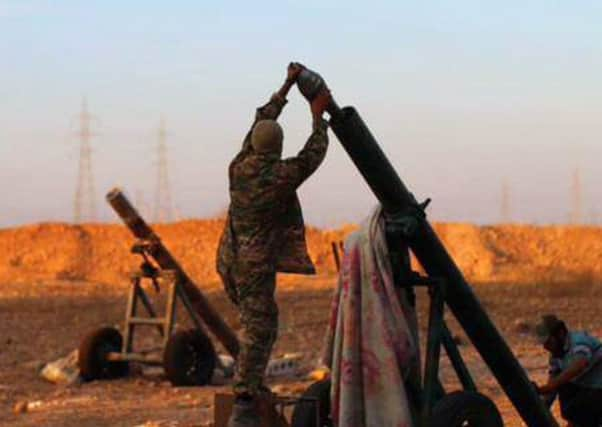Michael Fallon to press for military action in Syria


Michael Fallon said that ministers remain committed to securing parliamentary support for RAF airstrikes in the country, despite Russia’s intervention in the conflict.
Speaking after talks in London with Ash Carter, his US counterpart, Mr Fallon warned that Russian air and missile strikes in support of president Bashar Assad’s regime risked making “a grave situation even worse.”
Advertisement
Hide AdAdvertisement
Hide AdHowever, he made clear that ministers would not be deterred from seeking support for a new Commons vote for the RAF to join the US and other coalition aircraft in attacking IS in Syria as well as Iraq.
Mr Fallon said: “We will continue to build the case for military action in north-east Syria where IS is headquartered, where its command and control is. Russian intervention doesn’t change that. We will continue to build the case for intervention in the new parliament.”
His comments came after the former chief of MI6, Sir John Sawers, warned that there was a “real danger” of clashes between Russian and coalition warplanes if they continued to mount rival operations in the skies over Syria.
Prime Minister David Cameron has repeatedly made clear that while he wants to join the US in attacking IS in Syria, he will only seek a Commons vote if he can be sure of victory, which would need the support of a significant number of Labour MPs.
The talks between Mr Carter and Mr Fallon came after Nato defence ministers agreed on Thursday to a doubling of the alliance’s response force – to 40,000 – amid fears from eastern European states that they could be the next target of Russian aggression. Britain is to deploy around 100 troops to the Baltic states as part of a new US/German-led training, evaluation and capacity-building mission intended to strengthen Nato’s “persistent presence”.
Mr Fallon condemned the Russians for attacking mainstream opposition groups as well as the extremists who they claimed to be targeting.
Mr Carter said president Vladimir Putin’s support for the Assad regime was “illogical” and would ultimately only succeed in increasing support for the militants while turning the world against Moscow.
“They are going to have the effect of inflaming the very extremism that Russia claims to want to combat,” he said. “By taking the side of Assad they inflame the civil war – and extremism – and prolong the suffering of the Syrian people.”
Advertisement
Hide AdAdvertisement
Hide AdIt comes as Mr Carter confirmed the US is to overhaul its beleaguered Syrian rebel training programme.
The £325m initiative, set up to train and equip moderate Syrian rebels to fight IS, is widely considered to have been a failure, producing fewer than 80 soldiers, many of whom have fled, been captured or were killed in early fighting.
US officials have said the new effort would focus more on embedding recruits with established Kurdish and Arab units, rather than sending them directly into frontline combat.
“The work we’ve done with the Kurds in northern Syria is an example of an effective approach,” Mr Carter added. “That’s exactly the kind of example that we would like to pursue with other groups in other parts of Syria.”
He described the revised scheme as a “more strategic approach” and admitted he “was not satisfied” with early efforts. of the programme. As part of the changes, the US-trained rebels would be attached to larger existing Kurdish and Arab forces. They would be equipped with US communications gear and trained to provide intelligence and to designate IS targets for airstrikes in co-ordination with US troops outside Syria, the officials said.
The top US commander in the Middle East, General Lloyd Austin, acknowledged that the programme got off “to a slow start” and he told Congress he was looking at options to best employ the moderate forces.
Officials have also said the new plan scales back the number of rebels the US expects to train from the initial 5,400 per year to a much smaller total. It also would streamline the vetting process designed to weed out terrorist infiltrators.